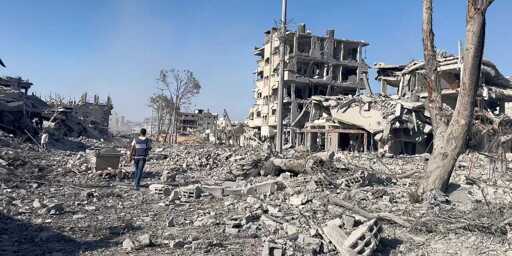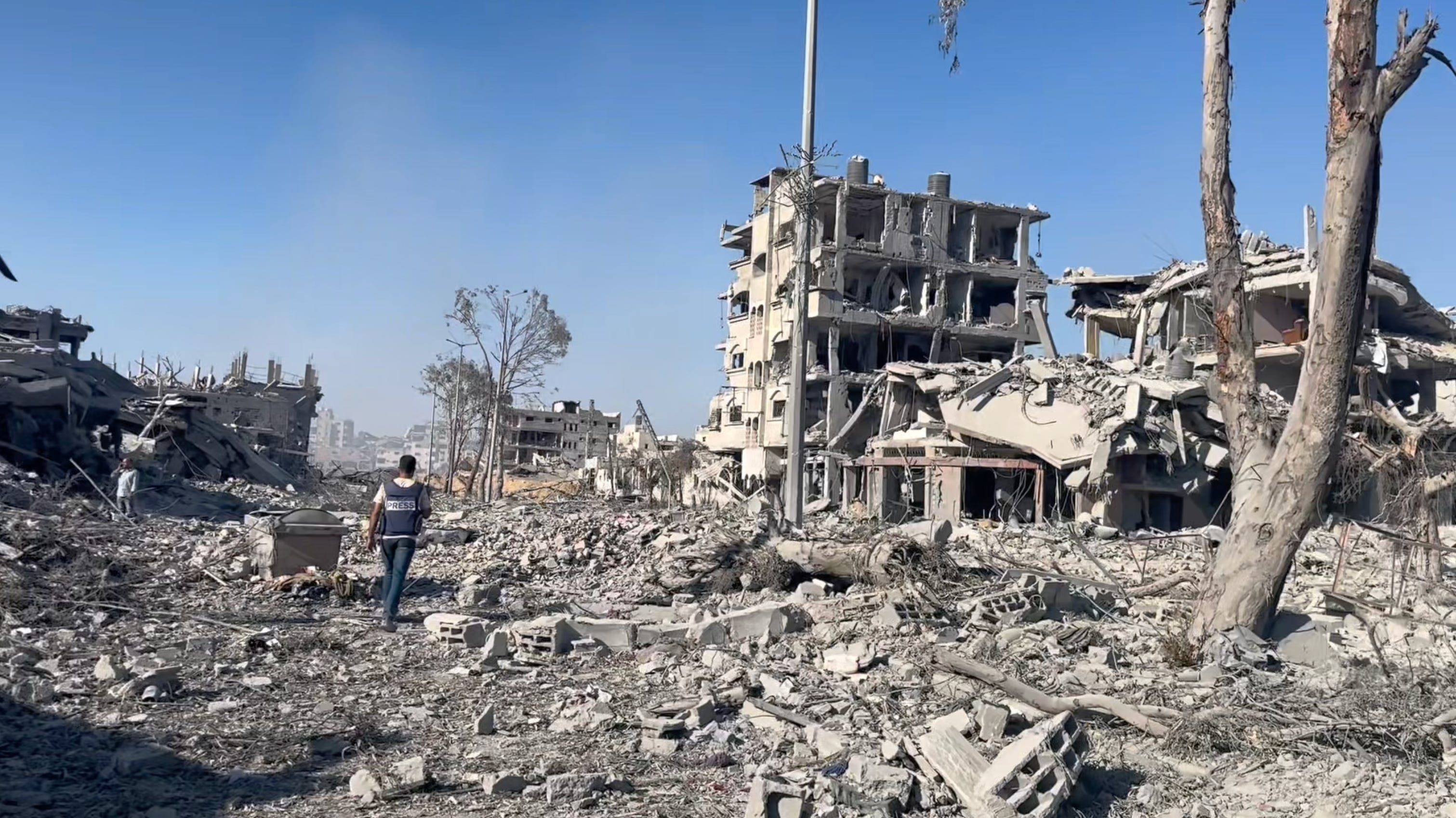The ceasefire in Gaza went into effect at 12 p.m. on Friday following the announcement of an agreement by Palestinian factions on Wednesday evening and the Israeli cabinet approving the deal on Thursday night. The bombs have stopped and Israeli troops have withdrawn to the agreed upon lines, retaining control of 53% of Gaza. Tens of thousands of Palestinians returned to the north today, making their way along the coastal Al-Rashid road. The exchange of Israeli and Palestinian captives is expected on Monday or—according to President Donald Trump—possibly Tuesday.
While many Palestinians in Gaza are celebrating the deal, the elation is also tempered by fear that Israel will restart the genocide whenever it wants.
Drop Site contacted five Palestinian journalists—four in Gaza and one in exile—to get their reactions to the news. Their responses were submitted on Thursday.
— Sharif Abdel Kouddous
A journalist walks through the ruins of Gaza City on October 10, 2025. (Screenshot of video by Abdel Qader Sabbah.)
Huda Skaik in Gaza City.
Most recent article in Drop Site: “Living in the Remnants of Gaza City”
When the ceasefire was announced, my heart trembled with a feeling I almost didn’t recognize: hope. After two whole years of terror, for the first time in so long, the sky will be clear from smoke and airstrikes, and Gaza will breathe again. The thought that the bombs might stop, even for a day, filled me with something close to relief. I wanted to believe that maybe this time, it would last and we could begin to re-live—that maybe we could begin to rebuild what we lost, to sleep without fear, to dream freely again.
I have mixed feelings of happiness and sadness because when the war ends, another struggle will begin—an internal war. Our wounds will reopen, and we will have time to grieve our beloved ones, to give sadness the time it needs. We may have survived physically, but we haven’t survived mentally. This genocide lives inside us. It swallowed our loved ones, our youth, our dreams. I think this genocide will stay living inside us forever in our minds.
But we are so relieved that we can stay in our homes now, without constant displacement; that we can move in our cities without fear of bombing. We hope this is the real end and that Gaza might survive. I cannot believe that I am still alive after this unbearable genocide that felt like a ghost forever haunting us. We hope this ceasefire brings with it a permanent and lasting peace.
Abdel Qader Sabbah in Deir al-Balah after being displaced from Gaza City in September.
Most recent article in Drop Site: “Death is Better Than This Life”: Displaced Palestinians in Gaza Are Being Bombed in Their Tents
As a journalist who has lived through the war in Gaza from the very beginning until this moment, I have witnessed multiple phases of ceasefires—some held for a while and others collapsed quickly—and the price was always the blood of Palestinians and the severed remains of the innocent.
This time, it can be said that we sense a degree of seriousness, perhaps early signs of a genuine ceasefire. But fear is still present—the fear that a setback might recur, that the war could return as it was, especially after the Israeli army pulled back from areas in Gaza, a withdrawal not without cunning and calculation.
Despite all that can be said about this relative calm, the joy of the war coming to a halt remains incomplete. We have lost loved ones, family, and friends, and we have lost our homes and the places that held our memories. Even so, stopping the bloodshed remains the most worthy and humane option at this stage.
Rasha Abou Jalal in Nuseirat after being displaced from Gaza City in September.
Most recent article in Drop Site: We Tried to Stay in Gaza City. There Are No Longer Any Means of Sustaining Life.
On the eve of the announcement of the ceasefire, I was with my family inside our tent, where we had taken refuge after being displaced from Gaza City to Nuseirat in central Gaza. I was following the news and the progress of the negotiations closely, and there was a voice inside me telling me that the talks would succeed this time. I felt that the involvement of important Arab and Islamic countries such as Egypt, Turkey, and Qatar, would give the negotiations a real push toward success.
It was getting late as we waited for the ceasefire announcement filled with deep fears that it might fail for any reason. Eventually, we surrendered to sleep. I only woke up at six in the morning to the voice of my husband telling me, “They did it. The agreement has been signed.” At first, I couldn’t believe it—I thought I was dreaming. When I gathered myself, I rushed to catch up on the news I had missed. I read several statements confirming that an agreement had been reached. I was reading the headlines out loud, filled with joy. I told my children, “The war is finally over.” They cheered and celebrated around me. My little daughter asked, “Has the bombing stopped?” I said, “Yes, it’s over. Death has ended.” I thanked God endlessly.
At that very moment, a few drops of rain began to fall from the sky. I stood beneath them, opened my arms wide to welcome them. I wanted the rain to soak me, to wash away the traces of this war that has lasted for two years; two full years of death, hunger, and displacement.
Sara Awad in Deir al-Balah after being displaced from Gaza City in September.
Most recent article in Drop Site: “My Family Managed to Stay in Our Home in Gaza City. Until Now.”
Today, October 9, 2025, marks the last day of this war. A ceasefire agreement has been officially signed. Reports on the news are filled with optimism and promises of a better future for Gaza. So many promises are being made. But why do I feel nothing?
It’s not just me. My family, friends, and colleagues feel the same.
I looked away from the ceasefire negotiations for months, protecting what was left of my hope in this life. But the news this time feels different. I don’t know what changed—maybe two years of genocidal war was finally enough to stop it.
I chose to be cautious before sharing any news of the talks with my family. I know how trapped they are, how deeply they long to go back home. Living in a tent is not a life. I feel sorry for the displaced families whose suffering will not end with this ceasefire. My family and I share a small piece of land with three other families in tents—all of them have lost their homes forever. I asked them how they felt about the deal and I heard the same answer from each one: “Nothing will change. We’ll stay here, in the tent.”
I’m not happy. I’m not sad. I only feel sorry for everything we’ve lost in this war—loved ones, homes, our future. I scroll through Instagram stories from my people, those who’ve lost family members, and my heart breaks into a million pieces. Their suffering won’t end—not even with the end of this genocide.
I walked through the streets after the announcement. I saw how everyone was feeling good at the prospect of two full years of death coming to an end. We are tired. We are exhausted.
Yet we can find space to celebrate the first good news throughout these two long years. “We will go back to Gaza City, I swear,” said one vendor who was displaced from his home, like thousands of others.
No one in Gaza can fully comprehend the days ahead. We all pray for peace, safety, food, health, and freedom. But no one knows if this agreement will truly hold, or if it will end in broken promises as what happened back in March.
I hope, as everyone does, to reclaim what this war has stolen from us, sooner than later. Sooner.
Hamza Salha in Limerick, Ireland, after being evacuated from Gaza for a scholarship at the University of Limerick in August.
Most recent article in Drop Site: Israel is Attacking Deir al-Balah, Gaza’s Last Standing City
In the middle of last night, while I was sitting at my desk taking a quick break between my university assignments to browse the internet, smiling delegations in Sharm El-Sheikh suddenly appeared before me, accompanied by the news that a ceasefire agreement had been reached. Then followed a video of the U.S. Secretary of State whispering in President Trump’s ear that a deal was about to be finalized.
I had grown accustomed to such news over the past two years in Gaza. It was usually followed by disappointment. Such headlines could no longer deceive me so easily—not after the immunity my mind had built up against them to protect me from shattered hopes. It was difficult for me to believe it at first. I tracked every word in the news copy and watched all the video reports to be certain that an agreement had truly been reached. I had become skilled at tracing the nuances in terminology, its implications, and its context, so I could form my own analysis of the coming days in this harshest of wars.
Nearly 24 hours after the agreement was announced, I still doubt it will be implemented in reality, or that the war will not return. It’s as if war has become an inseparable part of our lives. I do not trust the Israeli government or Trump’s government, no matter how much good faith they pledge. Those who reignited the war once before could easily reignite it again a thousand times.
It was only after the war stopped that I realized the real war was just about to begin—the struggle with trauma, with a broken geography, with the future. When I called my family in Gaza, they were not as happy as I thought they would be. The one thing they were mostly happy about was the prospect of eating grilled chicken again after two years of Israel’s vicious blockade. It might seem silly, but the idea of having grilled chicken with my family in the rubble of our demolished house in Jabaliya made me want to return home. My family didn’t know where to return to once the road north opened. I am certain my father intends to erect a tent on the rubble of our home and live there.
Who said the war ends once the bombardment and airstrikes stop—assuming Israel commits to that? Who will bring back my friend and lifelong companion, Yahya, whom the occupation killed? Who will heal my wounded body, still untreated to this day? Who will rebuild my home and my neighborhood? Who will restore my parents’ deteriorated health? Who will save my nieces and nephews after years without education and basic essentials like proper food? Who will free my imprisoned brother from his cell? Who will return to us the olive tree that once filled our courtyard?
There is only one positive thing about this ceasefire: the torrents of blood will stop after two years, even though our blood has been spilling since 1948. I may seem unrealistic in hoping that it will stop after this war ends.
This war has planted within the Palestinians of Gaza an illness and a pain that will not be cured. We will carry it wherever we go, passing it on to the coming generations. What has been happening in Gaza for the past two years is nothing less than an attempt by Israel to ethnically cleanse the Gaza Strip of Palestinians. Israel still has its weapons of collective punishment—its bombs, its power to restrict the entry of food and medicine and reconstruction materials. Who can guarantee it will not use them against us once again after it retrieves its captives to achieve its ultimate goal of erasing us?
For an exile like myself, the best scenario is for the war to end, for my homeland to be rebuilt, and for the occupation to disappear so I may return and live freely in my own land. Everything in Ireland is desolate, nothing resembles me here, even though the country is overflowing with natural beauty and architecture. Even listening to Fairuz in the morning or Umm Kulthum in the evening means nothing here as it did back home. I knew life here would be lonely, but the occupation forced me to make the impossible choice between exile and living in a place that has become a barren desert after the occupation stripped it of all signs of life. Curse the occupation.
From Drop Site News via this RSS feed



